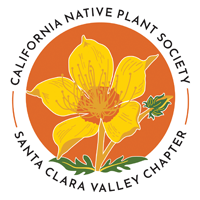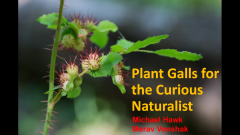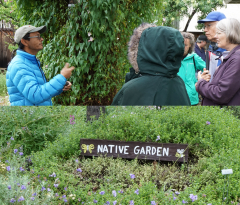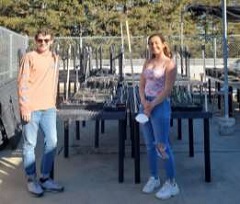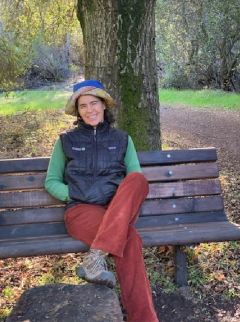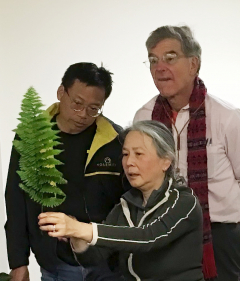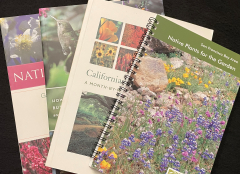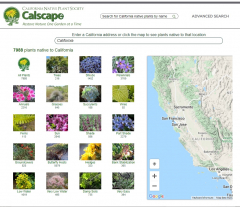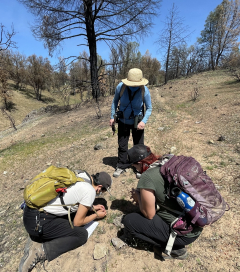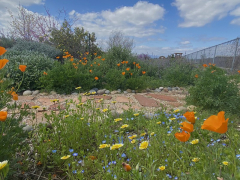 The CNPS SCV Native Plant Lecture Series has something for everyone -- whether you're curious about native plants, an experienced or aspiring native plant gardener or a professional botanist, you will find something to interest and educate you in our offerings. From gardening to plant science to conservation to tours of botanical hot spots, if you're interested in California's native plants, there's something here for you. Most of our lectures are on Wednesday evening. Our talks are live presentations followed by Q&As with the viewing audience. They are live streamed simultaneously to Zoom and YouTube.
The CNPS SCV Native Plant Lecture Series has something for everyone -- whether you're curious about native plants, an experienced or aspiring native plant gardener or a professional botanist, you will find something to interest and educate you in our offerings. From gardening to plant science to conservation to tours of botanical hot spots, if you're interested in California's native plants, there's something here for you. Most of our lectures are on Wednesday evening. Our talks are live presentations followed by Q&As with the viewing audience. They are live streamed simultaneously to Zoom and YouTube.
View past talks on our YouTube channel: https://www.youtube.com/c/CNPSSantaClaraValley
Upcoming Talks
Wednesday, September 21, 2022, 7:30pm
Finding and Appreciating Bay Area Plant Galls, a talk by Michael Hawk and Merav Vonshak
Galls are intriguing plant structures induced by insects (usually), creating a sheltered home for the larval stages of the inducing organism. They have diverse and sometimes incredible shapes and colors, and their natural history is equally fascinating, with complex life cycles, tiny parasites, and more!
Michael Hawk (Nature's Archive podcast and Jumpstart Nature) and Dr. Merav Vonshak (BioBlitz Club) will talk about gall biology, common host plants and gall inducers. They will discuss how you can find and identify galls, with numerous examples including gall look-alikes.
This talk will be live streamed on Zoom (requires advance registration) and YouTube (registration NOT required).
Recent Talks
Locally Native Plants for Bay Area Gardens, a talk by Arvind Kumar
September 7, 2022
Watch on YouTube
The Bay Area is home to a great diversity of native plants that have evolved to fill its many ecological niches: microclimates, soils, aspects, and hydrology. This talk will introduce you to locally native plants that are suitable for the home garden: plants that are beautiful, easy to grow and with great habitat value.
Arvind Kumar leads volunteer workdays at the Lake Cunningham Native Garden in San Jose (see page ). He is a past President of our CNPS Chapter and has served on the State CNPS board. He is an engineer by training, a lazy gardener by choice, and a bit obsessed about native plants.
The Amah Mutsun: Traditional Knowledge to Steward Mother Earth, Rick Flores
August 10, 2022
Watch on YouTube
For thousands of years the Native people of California's Central Coast managed, stewarded, and sustained ecosystems and plant populations. This talk focuses on the Amah Mutsun Tribal Band's efforts to revitalize their culture through the relearning of traditional ecological knowledge (TEK) and the formation of the Amah Mutsun Land Trust.
Rick Flores is the Director of Horticulture and Steward of the Amah Mutsun Relearning Program (AMRP) at the UCSC Arboretum & Botanic Garden where he has worked for more than 20 years. He holds both a B.A. and M.A. in Environmental Studies from UCSC. He is also a Reseach Associate for the Amah Mutsun Land Trust and a Board member at Pie Ranch.
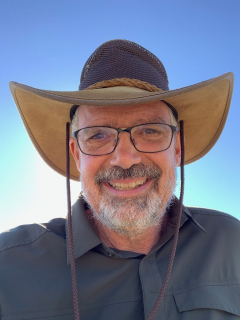 California Native Trees: Climate Change and Adaptation, a talk by Dave Muffly
California Native Trees: Climate Change and Adaptation, a talk by Dave Muffly
July 13, 2022
Watch on YouTube
As the reality of climate change comes into focus, questions arise regarding the fate of our native trees. From the seashore to the mountain top, our trees face unprecedented pressure, and we are only just beginning to discern patterns of adaptation. In this talk, Dave will focus on the native trees that provide the greatest support to native biodiversity in the coastal zones. He will look at scientific range projections for key species and review 40 years of local oak tree performance in local reforestation plantings.
Dave will also cover some of the rare oaks from Southern California which are beginning to be planted in the urbanized Bay Area, and consider ways in which the developed urban matrix may be utilized to provide surprising support for migrating biodiversity. Because oaks are genetically fascinating and frustrating, he will discuss historical patterns of oak evolution during previous rapid climate change events, to gain an understanding of how those patterns may be applied to our current circumstances to minimize biodiversity collapse. He will take a peek at the super diverse madro-tertiary geoflora and ponder what California may look like in a substantially warmed world.
Dave Muffly has been planting and caring for trees in the Bay Area for 33 years. Dave earned a degree in mechanical engineering from Stanford University, then branched into native oak plantings at Stanford, urban tree plantings and fruit trees with the local service organization Magic. In 2007, Dave became an ISA Board Certified Master Arborist and designed the thousand tree 101 freeway soundwall planting, between San Antonio Ave. and Willow Rd., led by the non-profit Canopy. The soundwall plantings became the proof of concept for the even more radically diverse plantings at Apple Park in Cupertino, where Dave spent seven years as Apple’s senior arborist.
CNPS SCV 2021-2022 Research Scholarship Projects
June 1, 2022
Watch on YouTube
Lauren Hamm, UC Berkeley (Graduate Scholarship Winner) Evolutionary Dynamics of Climate Stress ̶ Responsive Mobile Elements in Yellow Monkeyflower Yellow monkeyflower can be found surviving anywhere water is available. However, the steadily increasing temperatures and hyper-variability in climate across California may affect the survival of these populations as water becomes scarcer. Lauren will be using collections of monkeyflower from locations around the state to investigate how climate change affects the movement of transposable elements, also affectionately known as “jumping genes” because of their ability to replicate and move around the genome.
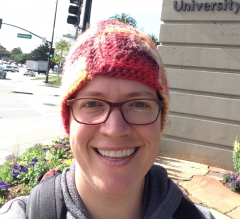 California Ethnobotany for Learners of All Ages, a talk by Jane Rieder
California Ethnobotany for Learners of All Ages, a talk by Jane Rieder
May 11, 2022
Watch on YouTube
California has a wealth of diverse ecosystems for plant and animal communities, which gives our beautiful state a variety of habitats for people and other creatures. The native people of California have practiced sophisticated ecosystem engineering for thousands of years, using plants to meet human needs for food, shelter, tools, decorations, medicine and fiber. In this talk, we’ll learn about the discipline of ethnobotany and explore some of the traditional human uses of California native plants. This talk is suitable for kids as well as adults.
When Jane Rieder was two years old, her parents called her the Baby Botanist, so she thinks it’s fair to say that she’s a lifelong lover of plants. As an adult, she uses her knowledge and interest in plants in her roles as a high school botany teacher, a parent, a gardener, a hiker, an amateur scientist and a cook. She loves teaching other people about the amazing world of botany!
New Calflora Tools for Your Native Plant Ventures and Adventures, a talk by Cynthia Powell
March 16, 2022
Watch on YouTube
Cynthia Powell is Calflora’s Executive Director. She graduated with her MS in GIS in 2010 forecasting Mokelumne River water supply based on MODIS remote sensing snow pack images. She’s been examining what was under that snow — plants — ever since. She coordinates all of Calflora’s programs, research, outreach, and advocacy, as well as fundraising and management.
Keying With Natives: Basics of Plant Taxonomy, a talk by Dee Himes
February 18, 2022
Watch on YouTube
The CNPS SCV Keying with Natives (KWN) group is learns plant keying by practicing on plant samples. Dee Himes of the KWN group teaches two special online classes that go over the basics of Plant Morphology (https://youtu.be/phvVMbk01CA) and the basics of Plant Taxonomy. These classes cover the basic principles of morphology, which is the study of the form, external structure and development of plants; and the basic principles of taxonomy, which is to learn and look at different plant families. The classes form a great crash course for beginners who are enthusiastic about learning how and why some plants are named ̶ and for others they’ll form a refresher. By knowing the basic morphological characteristics of plants, a plant’s name will become obvious. Once the plant has been identified, it can be placed within categories, a plant family, a classification system that is part of plant taxonomy. As you attend you may want to have ready a copy of Plant Identification Terminology, An Illustrated Glossary, by James G. Harris and Melinda Woolf Harris, 2nd Edition.
Dee Himes is a CNPS SCV board member, Field Trip Chair, and former chapter Treasurer (2012-2014) and Field Chair (2014-2018). She is also an active “Weed Warrior” at Edgewood County Park and Preserve. She is now an Adjunct Instructor of horticulture at Foothill College, in their Environmental Horticulture and Design program, which she also graduated from with an A.S. in 2006. Dee is passionate about sharing her landscape and horticultural experiences and expertise in caring for California native gardens that includes sustainable gardening practices.
Favorite Native Plant Books and Resources, Panel Presentation and Interactive Discussion
February 9, 2022
Watch on YouTube
Just getting started with native plant gardening or trying to find solutions in your existing garden? In this panel discussion, Madeline Morrow, Shelkie Tao and Vivian Neou discuss the books and resources they find most helpful. The talk will be interactive: there will be ample time for the audience to ask questions, comment on books, and suggest more helpful books or other resources. A list will be compiled and shared with attendees.
Madeline Morrow will moderate the panel and discussion. Madeline is a past president of our CNPS Chapter and current board member. Her garden was featured in Bay Nature magazine in March 2013 and has been on the Growing Natives Garden Tour for many years.
Picking the Perfect Plants for your Garden with Calscape, a talk by Vivian Neou
February 2, 2022
Watch on YouTube
Finding the right native plants for your garden can be challenging. Calscape can make it easy. From showing you a list of plants that grow naturally at your site to picking the plants that will attract and support the most butterflies, Calscape provides a wealth of resources to help you choose and find the best plants. In this talk, Vivian Neou will introduce you to Calscape ̶ including how to create a customized plant list, how to choose the right tree, shrub or perennial, and where you can purchase the plants you want.
Visit Calscape, a CNPS site created with the help of many sources, at calscape.org.
Keying With Natives: Basics of Plant Morphology, a talk by Dee Himes
January 21, 2022
Watch on YouTube
The CNPS SCV Keying with Natives (KWN) group is learns plant keying by practicing on plant samples. Dee Himes of the KWN group teaches two special online classes that go over the basics of Plant Morphology (https://youtu.be/phvVMbk01CA) and the basics of Plant Taxonomy. These classes cover the basic principles of morphology, which is the study of the form, external structure and development of plants; and the basic principles of taxonomy, which is to learn and look at different plant families. The classes form a great crash course for beginners who are enthusiastic about learning how and why some plants are named ̶ and for others they’ll form a refresher. By knowing the basic morphological characteristics of plants, a plant’s name will become obvious. Once the plant has been identified, it can be placed within categories, a plant family, a classification system that is part of plant taxonomy. As you attend you may want to have ready a copy of Plant Identification Terminology, An Illustrated Glossary, by James G. Harris and Melinda Woolf Harris, 2nd Edition.
Dee Himes is a CNPS SCV board member, Field Trip Chair, and former chapter Treasurer (2012-2014) and Field Chair (2014-2018). She is also an active “Weed Warrior” at Edgewood County Park and Preserve. She is now an Adjunct Instructor of horticulture at Foothill College, in their Environmental Horticulture and Design program, which she also graduated from with an A.S. in 2006. Dee is passionate about sharing her landscape and horticultural experiences and expertise in caring for California native gardens that includes sustainable gardening practices.
Treasure Hunting after the 2020 Fires, a talk by Amy Patten
January 19, 2022
Watch on YouTube
Amy Patten is a staff member at the CNPS state office in the Rare Plant Program. Amy manages the Rare Plant Treasure Hunt, a community science effort which collects up-to-date information on rare plant populations to improve conservation and management and provides botany skills training to volunteers. Amy is a longtime resident of Santa Cruz County and is passionate about our local natural history and conservation. Amy earned a B.S. in Ecology and Evolutionary Biology from U.C. Santa Cruz in 2009.
Profile of a Garden: Martial Cottle Native Plant Garden, a talk by Stephanie Morris
January 12, 2022
Watch on YouTube
Learn when this garden was established in San Jose and enjoy captivating photos by Hank Morales showing the plants in the garden, seasonal highlights, and wildlife. What is most rewarding for Ann as she volunteers at the garden? What are the challenges to be learned from? What are her primary maintenance activities and what aspects of the garden fuel her continued volunteering? The garden includes a pollinator garden that is 100% California native, an area dedicated for large California native shrubs and trees, and some spaces that are combinations of native and Mediterranean plants. This talk was inspired by an in-person tour of this garden last year. It’s a place worth exploring again with our virtual audience as we also ponder: what makes a volunteer?
Stephanie Morris is a Landscape Architect with a focus on Native Plant Design. Ann Finney is a Master Gardener who volunteers at UC Master Gardeners Native Plant Demonstration Garden at Martial Cottle Park.